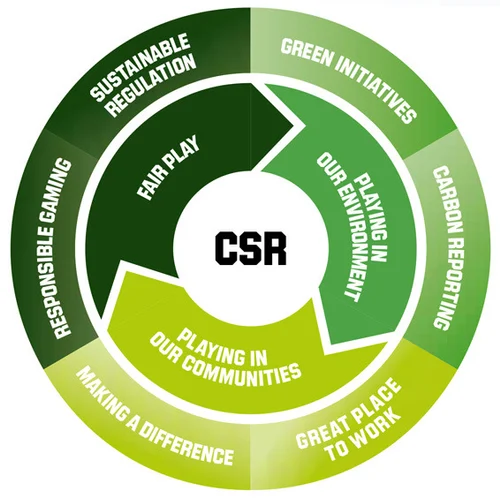In today’s dynamic business landscape, the concept of Corporate Social Responsibility (CSR) has transcended its traditional image of mere philanthropy. No longer just a “nice-to-have” add-on, CSR has emerged as a strategic imperative – a powerful tool that, when integrated deeply into core business operations, drives sustainable growth, enhances brand value, and creates long-term shareholder value. From the bustling streets of South Africa to global markets, businesses are recognizing that genuine social and environmental responsibility isn’t just about “giving back”; it’s about building a better, more resilient, and more profitable future.
This comprehensive guide will explore how strategic integration of CSR transforms it from a cost centre into a value generator, aligning social and environmental initiatives with a company’s mission, values, and overarching business goals. We’ll delve into the multifaceted benefits, practical approaches, and essential considerations for making CSR a cornerstone of your business strategy.
The Evolution of CSR: From Charity to Strategy
Historically, CSR was often confined to annual donations, sponsorships, or employee volunteer days – activities largely disconnected from the company’s core operations. While these acts of philanthropy are commendable, they often lacked a clear strategic link to business objectives. The narrative was simple: make profits, then share some.
However, the 21st century brought a seismic shift. Increased global interconnectedness, rising consumer awareness, greater transparency, thanks to digital media, and the undeniable impacts of climate change and social inequality have propelled CSR to the forefront. Stakeholders – from customers and employees to investors and regulators – now expect businesses to play a more active and responsible role in society.
This shift has given rise to Strategic CSR. Unlike its philanthropic predecessor, Strategic CSR is purpose-driven and integrated. It’s about identifying social and environmental issues that intersect with a company’s business model, leveraging core competencies to address them, and in doing so, creating shared value – value for both society and the business itself. It recognizes that a healthy society and a healthy environment are preconditions for a thriving economy and sustained business success.
Why Strategic CSR is No Longer Optional: The Business Case

The argument for strategic CSR is compelling, offering a myriad of benefits that directly contribute to the bottom line and long-term viability.
1. Enhanced Brand Reputation and Consumer Trust: The Power of Purpose
In an age of conscious consumerism, reputation is currency. Consumers, particularly younger generations, are increasingly choosing brands that align with their values. A strong, authentically communicated CSR strategy can significantly enhance a company’s brand image and foster deep consumer trust.
- Attracting and Retaining Customers: Studies consistently show that consumers are willing to pay more for products from socially responsible companies. By demonstrating a commitment to ethical practices, environmental stewardship, or community development, businesses can differentiate themselves in crowded markets. For example, a coffee shop in South Africa sourcing fair-trade beans and supporting local community projects will likely attract a more loyal customer base than one focused solely on price.
- Building Brand Loyalty: When customers feel a connection to a brand’s purpose, their loyalty deepens. This emotional bond translates into repeat purchases, positive word-of-mouth marketing, and resilience during challenging times.
- Mitigating Reputational Risks: In the age of social media, a single misstep can quickly spiral into a public relations crisis. A history of genuine CSR engagement can act as a buffer, demonstrating good intent and building goodwill that can help a company weather storms.
2. Attracting and Retaining Top Talent: The Human Capital Advantage
The modern workforce, especially millennials and Gen Z, seeks more than just a paycheck. They want to work for organizations that have a positive impact on the world. Strategic CSR is a powerful tool for talent acquisition and retention.
- Employer Branding: Companies known for their strong CSR initiatives become highly attractive employers. They are seen as ethical, forward-thinking, and caring – qualities that resonate deeply with purpose-driven individuals.
- Employee Engagement and Productivity: When employees feel proud of their company’s social and environmental contributions, their engagement levels soar. Engaged employees are more motivated, productive, and less likely to leave, leading to reduced recruitment and training costs.
- Boosting Morale and Culture: CSR programs, such as employee volunteering or workplace giving, can foster a sense of camaraderie and shared purpose, strengthening company culture and boosting morale. This is particularly relevant in diverse business hubs like South Africa, where attracting and retaining skilled professionals is highly competitive.
3. Operational Efficiencies and Cost Savings: Doing Good While Doing Well
Strategic CSR isn’t always about spending more; it can often lead to significant operational efficiencies and cost reductions.
- Resource Optimization: Initiatives focused on reducing waste, conserving water, or optimizing energy consumption directly translate into lower operating costs. For instance, investing in energy-efficient machinery or implementing recycling programs not only benefits the environment but also cuts utility bills and waste disposal expenses.
- Supply Chain Management: By scrutinizing supply chains for ethical and environmental compliance, companies can identify inefficiencies, reduce risks, and potentially negotiate better terms with responsible suppliers. This proactive approach prevents costly disruptions and reputational damage.
- Regulatory Compliance and Innovation: Staying ahead of environmental regulations through sustainable practices can avoid fines and legal challenges. Furthermore, the pursuit of sustainable solutions often sparks innovation, leading to new products, processes, and business models that offer a competitive edge.
4. Access to Capital and Investor Confidence: The ESG Imperative

The financial world is increasingly integrating Environmental, Social, and Governance (ESG) factors into investment decisions. Sustainable investing is no longer a niche; it’s mainstream, and strong CSR performance is a direct indicator of robust ESG credentials.
- Attracting ESG Investors: Institutional investors, pension funds, and a growing number of individual investors are actively seeking companies with strong ESG performance. These investors view responsible companies as less risky and more likely to achieve long-term financial stability and growth.
- Lower Cost of Capital: Companies with strong ESG ratings may benefit from a lower cost of capital, as lenders and investors perceive them as having better risk management and a more sustainable business model.
- Long-Term Value Creation: ESG-focused investors are less concerned with short-term gains and more interested in a company’s ability to create sustained value. Strategic CSR signals this long-term vision and commitment.
- Improved Analyst Ratings: Financial analysts are increasingly incorporating ESG factors into their assessments, and strong CSR performance can lead to more favorable ratings, further attracting investment.
5. Innovation and Market Differentiation: Paving New Paths
Addressing social and environmental challenges can be a powerful catalyst for innovation, leading to new products, services, and business opportunities.
- Sustainable Product Development: Companies that prioritize sustainability are often at the forefront of developing eco-friendly products, circular economy solutions, and ethical supply chains, capturing emerging market segments.
- New Business Models: CSR can inspire entirely new business models focused on social impact, such as those in the circular economy or impact investing space.
- Competitive Advantage: Being known as a socially and environmentally responsible innovator can differentiate a company from competitors, particularly in sectors where consumers are increasingly demanding sustainable alternatives. Imagine a tech startup in South Africa focused on developing energy-efficient solutions; their commitment to sustainability is part of their core value proposition.
6. Risk Management and Resilience: Building a Future-Proof Business
Strategic CSR helps companies proactively identify, assess, and mitigate a wide range of business risks – from regulatory and reputational to operational and systemic.
- Regulatory Compliance: Staying ahead of evolving environmental, labour, and social regulations reduces the risk of fines, legal action, and operational disruptions.
- Reputational Risk Mitigation: A strong CSR record builds trust and goodwill, which can be invaluable during a crisis, helping to protect the brand from severe reputational damage.
- Supply Chain Resilience: Ensuring ethical and sustainable practices throughout the supply chain reduces the risk of disruptions due to labour disputes, environmental violations, or human rights abuses.
- Systemic Risk Awareness: Engaging with broader social and environmental issues allows companies to better understand and prepare for systemic risks like climate change, resource scarcity, or social unrest, which can impact their operating environment.
Strategic Integration of CSR: Aligning Purpose with Profit
The core of effective CSR lies in its strategic integration. This means moving beyond standalone initiatives to weaving social and environmental responsibility into the very fabric of the business – its mission, values, strategy, and daily operations.
1. Defining Your Purpose and Values: The North Star
Before embarking on any CSR initiative, a company must clearly define its purpose beyond profit and articulate its core values. What impact does the company genuinely want to have on the world? What principles guide its decisions? This clarity forms the foundation for all strategic CSR efforts.
- Mission Statement: Your mission statement should reflect your commitment to social and environmental responsibility, making it an intrinsic part of your identity.
- Core Values: Embed values like integrity, respect for people, environmental stewardship, and community engagement into your corporate culture.
2. Materiality Assessment: Identifying What Matters Most
Not all social and environmental issues are equally relevant to every business. A materiality assessment is a crucial step in strategic CSR. It involves identifying and prioritizing the ESG issues that are most significant to your business and its stakeholders.
- Stakeholder Engagement: Engage with key stakeholders – employees, customers, investors, suppliers, communities, and regulators – to understand their concerns and expectations regarding social and environmental performance.
- Business Impact Analysis: Assess which social and environmental issues pose the greatest risks and opportunities for your company’s financial performance and operational stability. For an agriculture business in South Africa, water scarcity might be a material issue, whereas for a software company, data privacy might be more material.
- Prioritization Matrix: Create a matrix that plots issues based on their importance to stakeholders and their impact on the business. This helps focus resources on the most material issues.
3. Aligning CSR with Business Strategy: Creating Shared Value
Once material issues are identified, the next step is to align CSR initiatives with the company’s overarching business strategy. This is where “shared value” is created – where social and environmental improvements also drive business benefits.
- Leveraging Core Competencies: Identify how your company’s unique skills, products, and services can be used to address material social or environmental issues. A logistics company, for instance, might leverage its expertise to optimize delivery routes, reducing emissions and fuel costs.
- Innovation for Sustainability: Encourage R&D to develop sustainable products or processes that address both market needs and environmental concerns.
- Supply Chain Integration: Work collabouratively with suppliers to improve their social and environmental performance, ensuring a more resilient and responsible supply chain for your own operations.
- Targeted Community Investment: Rather than generic donations, invest in community projects that align with your business expertise or operational needs. For example, a construction company might support skills development programs in local communities, creating a talent pipeline.
4. Embedding CSR into Operations and Culture: From Policy to Practice

Strategic CSR is not just a policy; it’s an operational reality. It must be integrated into daily decision-making and permeate the organizational culture.
- Governance and Leadership: Establish clear leadership and governance structures for CSR, with oversight from senior management or the board of directors. Integrate CSR metrics into performance reviews.
- Cross-Functional Teams: Create cross-functional teams that bring together different departments (e.g., operations, marketing, HR, legal) to collabourate on CSR initiatives, ensuring widespread adoption and impact.
- Employee Training and Engagement: Educate employees about the company’s CSR commitments and empower them to contribute. Organize volunteering opportunities, green teams, or internal sustainability challenges.
- Supplier Engagement: Implement clear codes of conduct for suppliers, conduct regular audits, and provide support for them to improve their social and environmental performance. This is particularly crucial for businesses operating across diverse supply chains, a common reality in South Africa.
- Measurement and Reporting: Establish clear metrics and key performance indicators (KPIs) to track the impact of CSR initiatives. Regular and transparent reporting (e.g., through an annual sustainability report) is essential for demonstrating accountability to stakeholders.
5. Transparent Communication: Authenticity is Key
Communicating your CSR efforts effectively is vital, but it must be done with authenticity and transparency to avoid accusations of “greenwashing.”
- Honest Storytelling: Share your CSR journey – your successes, challenges, and lessons learned. Use clear, accessible language.
- Evidence-Based Claims: Back up your claims with data, certifications, and verifiable results. Avoid vague statements.
- Multi-Channel Approach: Utilize various channels – annual reports, websites, social media, press releases, employee communications – to reach different stakeholder groups.
- Stakeholder Dialogue: Engage in ongoing dialogue with stakeholders, listening to their feedback and incorporating their perspectives into your CSR strategy.
Challenges and Considerations in Strategic CSR
While the benefits are clear, implementing strategic CSR is not without its challenges.
- Measuring ROI: Quantifying the direct financial return on CSR investments can be complex, requiring sophisticated metrics and long-term perspectives.
- Greenwashing Risks: The pressure to appear “green” can lead some companies to make superficial or misleading claims, which can severely damage reputation if exposed.
- Supply Chain Complexity: Managing social and environmental risks across vast and intricate global supply chains can be incredibly challenging.
- Stakeholder Expectations: Balancing the often-diverse expectations of various stakeholder groups requires careful negotiation and clear communication.
- Resource Allocation: Dedicating sufficient financial and human resources to CSR initiatives, especially for smaller businesses, can be a hurdle.
The Future of Business is Responsible Business
For businesses operating in South Africa, and globally, strategic CSR is no longer a peripheral activity but a core driver of competitive advantage and long-term success. It’s about recognizing that a company’s prosperity is intrinsically linked to the well-being of its employees, the health of its communities, and the sustainability of the planet.
By aligning CSR initiatives with mission, values, and business goals, companies can:
- Build stronger brands and deeper customer loyalty.
- Attract and retain the best talent.
- Drive operational efficiencies and cost savings.
- Unlock new investment opportunities and lower capital costs.
- Foster innovation and differentiate in the market.
- Mitigate risks and enhance long-term resilience.
In essence, strategic CSR is about building a business that is not only profitable but also purposeful – a business that creates enduring value for all stakeholders, securing its place in a future where responsibility is the ultimate currency. The time to integrate, innovate, and lead with purpose is now.





 TAVE Tose is proud to announce that we are now the official distribution partner with PECB an internationally recognised certifying body for individuals in International Standard Organisation – ISO
TAVE Tose is proud to announce that we are now the official distribution partner with PECB an internationally recognised certifying body for individuals in International Standard Organisation – ISO